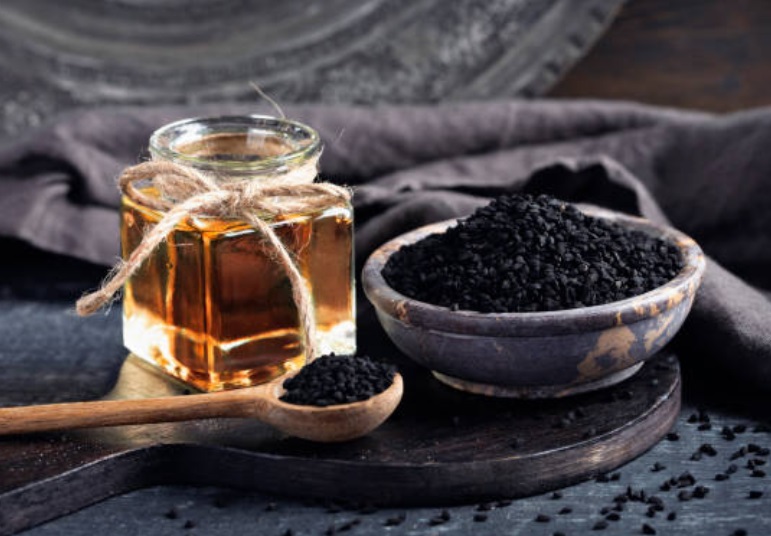Black seed (BS) (Nigella sativa), also known as black cumin or kalonji, has been used as a medicinal herb for centuries and continues to be popular today. These small, black seeds are packed with nutrients and bioactive compounds that offer a wide range of health benefits. In this comprehensive article, we will delve into the rich history of black seed, explore the scientific research behind its benefits, discuss its various uses, and examine its potential side effects.
A Historical Glimpse into Black Seed:
The use of black seed dates back to 3000 BC. The discovery of black seed in the tombs of Egyptian pharaohs underscores its significance and value in ancient civilizations. Prophet Muhammad (PBUH) is also known to have praised the benefits of black seed, referring to it as “the seed of blessing.” During the Middle Ages, black seed gained prominence as a medicinal herb, particularly in Europe, where it was used to combat outbreaks like the plague.
Nutritional Profile of Black Seed:
Black seed is a nutritional powerhouse, abundant in protein, fatty acids, vitamins, and minerals. Its unique composition, including bioactive compounds like thymoquinone, carvone, and nigellin, contributes to its numerous health benefits.
- Protein: BS boasts a remarkable 18-23% protein content, making it an excellent source of plant-based protein.
- Fatty Acids: BS contains a balanced ratio of omega-3 and omega-6 fatty acids, which are essential for cardiovascular health.
- Vitamins: BS is a rich source of vitamins A, B1, B2, B3, C, and E, all of which play a crucial role in strengthening the immune system and providing antioxidant protection.
- Minerals: BS is packed with essential minerals, including calcium, magnesium, potassium, iron, and zinc, which are vital for bone health, nerve function, and muscle contraction.
Health Benefits of Black Seed:
Black seed has been extensively studied and has demonstrated a wide range of health benefits, including:
- Antioxidant Activity: BS is a potent source of antioxidants that combat free radical damage, helping to delay aging and protect against chronic diseases like heart disease and cancer.
- Anti-inflammatory Properties: BS contains compounds that reduce inflammation, making it beneficial in managing inflammatory conditions like arthritis, rheumatism, and asthma.
- Immune System Enhancement: BS strengthens the immune system, boosting the body’s defense against infections.
- Improved Digestive Health: BS alleviates digestive issues such as indigestion, bloating, and gastritis.
- Respiratory Support: BS is effective in treating respiratory problems like coughs, colds, and asthma.
- Blood Sugar Regulation: BS may aid in blood sugar control for diabetic patients.
- Pain Relief: BS can help relieve pain associated with headaches, toothaches, and joint aches.
- Skin Health Protection: BS may be beneficial in treating skin conditions such as acne, eczema, and psoriasis.
- Brain Health Support: Some studies suggest that BS may protect against neurodegenerative diseases like Alzheimer’s and Parkinson’s.
Potential Side Effects of Black Seed:
While generally considered safe, BS may cause side effects in some individuals, including:
- Nausea and Vomiting: Excessive black seed consumption may lead to nausea and vomiting.
- Diarrhea: High doses of BS may cause diarrhea.
- Allergic Reactions: Individuals with allergies to related plants may experience allergic reactions to BS.
- Interactions with Medications: BS may interact with certain medications, so it is crucial to consult a healthcare professional before use.
Important Considerations:
- Pregnancy and Breastfeeding: Pregnant or breastfeeding women should consult their healthcare provider before using BS.
- Surgical Procedures: BS may affect blood clotting, so its use should be discontinued before and after surgery.
- Underlying Health Conditions: Individuals with underlying health conditions should consult their doctor before using BS.
Conclusion:
Black seed, a time-honored medicinal herb, offers a multitude of health benefits supported by scientific research. Its rich nutritional profile and bioactive compounds contribute to its effectiveness in addressing various health concerns. However, it is essential to use BS responsibly, considering potential side effects and seeking guidance from a healthcare professional when necessary. Remember, BS should not be considered a substitute for conventional medical treatment.
